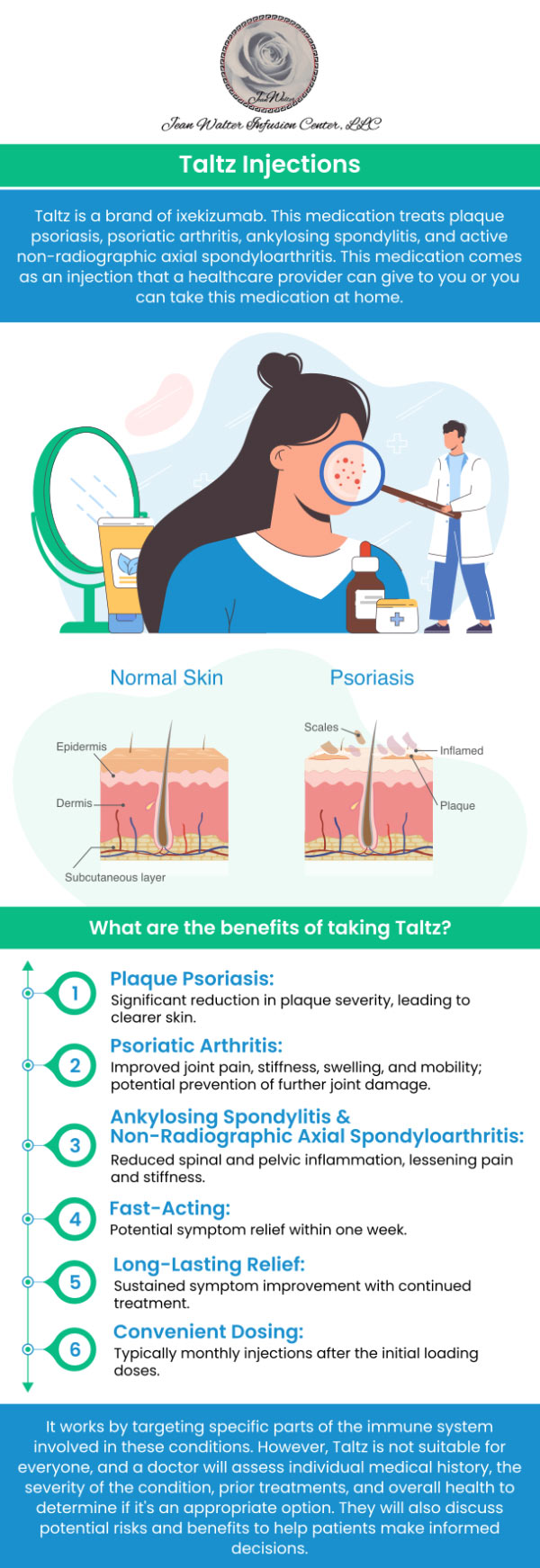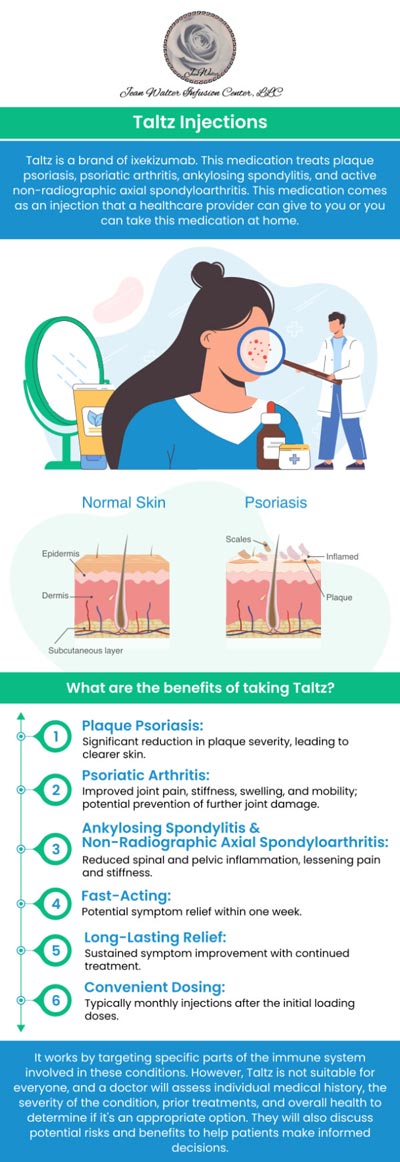How Can Taltz Injections Help Treat Inflammatory Skin Disease?
Inflammatory skin problems are autoimmune diseases that lead to redness, pain, itching, and dryness. They are complex to diagnose and treat. Some common inflammatory skin conditions are eczema, seborrheic dermatitis, and psoriasis. If you have been diagnosed with psoriasis or arthritis, you may qualify to be prescribed Taltz injections to help with your inflammatory skin disease. Visit Dr. Nasser Nasseri, MD, at Jean Walter Infusion Center for appropriate diagnosis and treatment of your condition. For more information, contact us or book an appointment online. We have convenient locations to serve you in Edgewater MD, Rosedale MD, North Baltimore MD, Columbia MD, Glen Burnie MD, and Catonsville MD.




Table of Contents:
How fast does Taltz work for psoriasis?
What does Taltz do to the body?
How does Taltz help psoriasis?
How long do you stay on Taltz?
Get Relief from Inflammatory Skin Disease with Taltz Injections from Dr. Nasser Nasseri, MD at Jean Walter Infusion Center
Each patient is different; however, we have noticed that 90% of patients who began Taltz injections saw a massive improvement in their psoriasis plaques within 12 weeks. Almost 90% of patients who continue Taltz see clear results for as long as 5 years later with continued therapy.
Taltz has been found to effectively reduce the physical symptoms associated with psoriasis, such as redness, scaling, and itching. Clinical studies have shown that individuals who received Taltz experienced a significant improvement in their skin condition compared to those who received a placebo. This reduction in symptoms not only enhances the skin’s overall appearance but also alleviates the discomfort and irritation caused by psoriasis. Moreover, Taltz has also been proven to improve joint symptoms and reduce inflammation in individuals with psoriatic arthritis. This condition often leads to joint pain, stiffness, and swelling, which can severely impact mobility and daily activities. By targeting the underlying inflammation, Taltz helps to alleviate these symptoms, allowing individuals to regain their physical functionality and improve their overall quality of life. However, it is important to note that Taltz may also have potential side effects. These reactions are generally mild and temporary. Additionally, our professionals indicate that individuals taking Taltz may experience upper respiratory infections and gastrointestinal issues. It is crucial for healthcare providers to monitor these side effects and provide appropriate guidance to patients.
Taltz works by inhibiting interleukin-17A, a protein that plays a crucial role in inflammation and immune response. By blocking this protein’s action, Taltz helps reduce the body’s inflammatory response, thereby alleviating the symptoms of psoriasis and psoriatic arthritis. This mechanism of action targets the root cause of these conditions, providing long-term relief for individuals. Furthermore, Taltz also suppresses the body’s immune system, which is overactive in individuals with autoimmune conditions like psoriasis and psoriatic arthritis. By modulating the immune response, Taltz helps to reduce the autoimmune reactions that contribute to the development and progression of these conditions. Additionally, Taltz has been found to impact specific cells and cytokines involved in the pathogenesis of psoriasis and psoriatic arthritis. It targets and inhibits the production of pro-inflammatory cytokines, such as tumor necrosis factor-alpha and interleukin-23, which play a significant role in the development of these conditions. By disrupting these inflammatory pathways, Taltz effectively reduces the severity of symptoms and improves overall disease control.
Taltz, a monoclonal antibody, was specifically designed to target and inhibit the interleukin-17A (IL-17A) pathway, which plays a crucial role in the development of psoriasis. By binding to IL-17A, Taltz effectively blocks its interaction with the receptor, thereby reducing the inflammatory response associated with psoriasis. This mechanism of action makes Taltz a promising treatment option for individuals with moderate to severe plaque psoriasis. In 2016, the U.S. This approval was based on the results of several clinical trials, which demonstrated the efficacy of Taltz in reducing psoriasis symptoms and improving patients’ quality of life. By targeting the IL-17A pathway, Taltz addresses the underlying cause of psoriasis, rather than just alleviating the symptoms.
Evaluating the efficacy of Taltz has consistently shown positive results. Taltz demonstrated significant improvements in patients with psoriasis. Patients treated with Taltz experienced a reduction in plaque thickness, erythema (redness), and scaling, leading to clearer and healthier-looking skin. Furthermore, the efficacy of Taltz is sustained over time. Dr. Bilal Hasan, MD, helps most patients maintain their response to treatment, with many achieving complete or near-complete clearance of their psoriasis symptoms.
For plaque psoriasis, the first dose of Taltz is two 80 mg injections on the same day (for a total of 160 mg). After that, you will get 80 mg injections every two weeks for 12 weeks. Then, your maintenance dose is an injection every 4 weeks for a duration based on your doctor’s advice.
Dr. Nasser Nasseri, MD is a board-certified rheumatologist at Jean Walter Infusion Center, specializing in the treatment of autoimmune and inflammatory conditions, including inflammatory skin diseases like psoriasis and eczema. With years of experience and advanced training, Dr. Nasseri brings deep expertise in using biologic therapies, such as Taltz injections, to treat complex conditions. Taltz, a biologic medication, works by targeting specific proteins that contribute to the inflammation and rapid skin cell turnover in conditions like psoriasis. This targeted therapy reduces symptoms like redness, scaling, and itching, providing patients with long-term relief. Dr. Nasseri takes a personalized approach to each patient’s care, carefully tailoring treatment plans to meet their specific needs and ensuring close monitoring for optimal results. Dr. Nasser Nasseri, MD, and his dedicated team at Jean Walter Infusion Center offer Taltz injections for skin diseases. If you suffer from inflammatory skin diseases, visit us. For more information, contact us or book an appointment online. We have convenient locations to serve you in Rosedale MD, North Baltimore MD, Columbia MD, Glen Burnie MD, Edgewater MD, and Catonsville MD. We serve patients from Rosedale MD, Edgewater MD, Columbia MD, Glen Burnie MD, Catonsville MD, North Baltimore, Parkville MD, Middle River MD, Dundalk MD, Halethrope MD, Ellicott City MD, Laurel MD, Hebbville MD, and Woodlawn MD.
Check Out Our 5 Star Reviews

Additional Services We Offer


- Infusion Therapy
- Injection Treatments
- Intravenous Immunoglobulin Therapy
- Medical Conditions
- Asthma
- Crohn’s Disease
- Fibromyalgia
- Gout
- Inflammatory Eye Disease
- Inflammatory Skin Disease
- Iron Deficiency
- Lupus
- Multiple Sclerosis
- Myositis
- Osteoporosis
- Rheumatoid Arthritis
- Ulcerative Colitis
- Vasculitis
- PRP Injections






